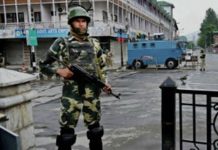THE SAVIOURS of Islam — or at least that is how the Taliban sees itself — now want Shariah to extend beyond the valley of Swat to the rest of Pakistan. No sooner had President Asif Ali Zardari consented to the Swat peace pact than an emboldened Taliban brazenly upped the ante. It will not disarm, is their latest missive.
The peace pact signified a strategic retreat by the Army, one which encouraged the ‘saviours’ to continue using religion to expand their political writ and base. Already, Sufi Mohammad — the key cleric who brokered the deal — has declared that there can be no appeal to the High Courts and the Supreme Court of Pakistan from judgements given out by Shariah courts. His argument, simply, is that Pakistan’s constitutional judicial system is ‘un-Islamic’. In other words, judicial power should be vested in the hands of qazis. Obviously, these qazis will be handpicked by Sufi Mohammad himself.

But the problem is not only about what the Taliban are capable of. The bigger problem is that Zardari has spent the last one year consolidating himself and not his beleaguered country. The peace pact was signed after nearly four lakh Swatis fled the Valley. After the Army said it could not fight its own people, and after terrified policemen advertised in newspapers proclaiming that they had resigned from the force. Zardari, in fact, is not alarmed that the Taliban has openly expressed its expansionist intent and has not only called for Shariah to be enforced throughout Pakistan but is slowly making its way towards Islamabad.
It is clear that the Taliban has little intention of keeping its end of the bargain: to end all terror activities, lay down arms and enable the local government to regain administrative control. On the contrary, Sufi Mohammad is now asserting that the Talibs accused of murder and extortion cannot be brought to book. This clearly indicates that the Taliban are only using the peace pact to gain greater power for themselves.
This steady encroachment towards Islamabad is also causing grave concern in Delhi’s political and intelligence circles. Intelligence agencies are now reporting that batches of Talibs are making their way across the border into Kashmir. What should worry them is the fact that scores of Talibs are intimately familiar with Kashmir, having been there to fight for the Harkat-ul-Ansar and the Harkat-ul- Mujahideen in the early and mid-90s, when the insurgency was at its peak.
The Talibs are intimately familiar with Kashmir and its insurgency. I can testify to this
can testify to this. While in Kabul in September 1996, when the Taliban were flush with victory after they had conquered the capital, I met any number of Talibs in Kabul and near the Panjsher Valley who gave graphic details of their battles against Indian security forces in Kashmir. Many were particularly keen to secure the release of their commander, Nasarullah Langriyal. Langriyal travelled from Afghanistan to Kashmir where he was arrested in 1993 for an attack on the Border Security Force.
As the meeting with the Talibs comes back in vivid detail, what stands out is what they told me back then — that they had only returned to Afghanistan to support the Taliban’s final push into Kabul, which they capped with the brutal hanging of then President Najibullah.
Flush with their victory in Swat, the Taliban will no doubt turn their attention to Kashmir once again. It is an integral part of their expansionist intent.










